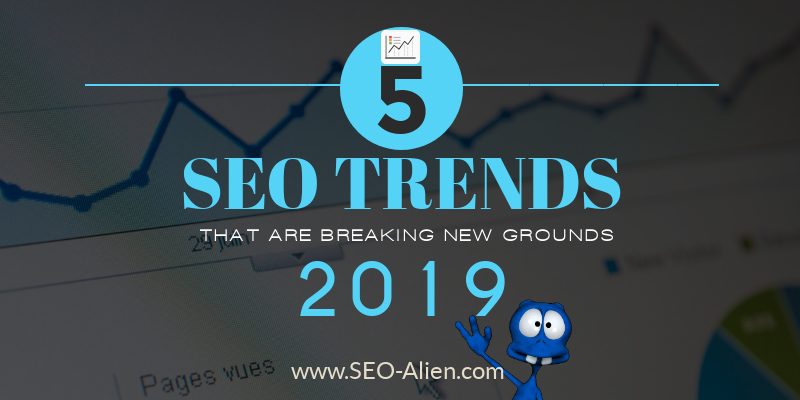In 2019 Build Your SEO Strategies Around These 5 Trends that are Breaking New Grounds!
It’s time to take a long view of SEO to understand how it will unfold in 2019 so that you can focus on the key result areas to develop suitable strategies.
What worked well for you yesterday may not at all be effective today. This is how it has been because Google keeps changing the rules of the game now and then. Since Google is tireless in its efforts to provide the best user experience and keeps raising the performance bar, it is natural that marketers and SEO experts must be on their toes to stay tuned to the best practices. Adapting the changes is a way for SEO.
Now, let us look at the ways to implement SEO for maximum effectiveness in 2019. It begins by understanding the priorities set by Google on which you marketers must base their strategies to use SEO most effectively with help from experts at https://redtailseo.com. In this article, we will discuss the trends that can make a difference in SEO performance in the current year. Once you know the trends, it becomes easy to create an action plan for achieving the goals that align with the trends.
As of now, mobile devices have been at the forefront of anything and everything that Google envisages in the SEO domain. In addition, site speed has also been a very important agenda for Google as it relentlessly backs speedy websites. It means, most of your SEO efforts in 2019 should be in that direction. However, there will some other vital elements beyond Google that will be no less important in influencing SEO campaigns that you must take note of.
Mobile first indexing
It has been 9 months now that Google started the practice of migrating sites to mobile first index in March 2018. Those not familiar with mobile first indexing should know that Google has started using your web page’s mobile version for indexing and even for ranking. This is a significant departure from the earlier method of indexing only web pages of the web version of the website which had been the norm from the first days of SEO.
Do not confuse mobile-first indexing with mobile only indexing because still there is a single index with both desktop and mobile versions. Once the site migration to mobile first indexing completes then Google will be using only the mobile versions for ranking. Since the mobile version becomes all important for ranking, you can ill afford to pay less attention to it.
If you are still waiting to migrate your site and make it mobile friendly, do it now before Google launches its mobile-first initiative, making it one-way traffic for SEO. Monitor the mobile pages to ensure that it delivers the best user experience in terms of speed and ease of navigation.
Do not compromise with page speed
Speed is a non-negotiable agenda for Google because it directly impacts user experience. Nobody likes slow websites that can tax the patience of users and deny them a pleasing browsing experience. For quite some time page speed was a ranking factor for desktop sites, and now it has been six months since July 2018 that Google has included mobile site speed as a ranking factor too. It means that you must understand which metrics Google considers for evaluating page speed.
The technical evaluation used to be the basis of judging websites that reflected in the results of Page Speed Insights, but now there has been a change to this approach both for desktop and mobile. Websites of both types are now graded not only based on Optimization but as well as for Speed.
Determining page loading time on users' devices by using data from Chrome User Experience is not very reliable because of too many variable factors. Instead, Optimization is entirely within your control. Results available from experiments show that the co-relation between Optimization and Ranking is very high, almost 97% and there is no proof that Speed affects ranking. Therefore, focus more on Optimization but do not neglect page Speed.
Ensure GDPR compliance
General Data Protection Regulation (GDPR) is a regulation passed by the EU or European Union that relates to the ownership of user-generated data from online interactions. The rule states that the data belongs to users who have the right to check it with the companies and even request export or correction. Although the regulation affects EU companies and its customers, international companies must also comply with it. This has prompted Google to bring changes to its Analytics. Data collected from users now expires in 26 months from the date of collection, but site owners can change it and even delete data on user’s request.
Depending on whether you have European customers or not you can choose the option ‘do not automatically expire’ in Google Analytics and take responsibility for data protection. Or, review your privacy requirements in line with GDPR for European customers.
The brand becomes a ranking signal
It's certain that Google uses brand mentions in search algorithms. Google learns about your brand entity by looking at unlinked brand mentions. Secondly, it pays attention to the elements that contribute to the sentiment and context by analyzing trust, reputation, advertising, etc. Reputation matters in ranking and overall sentiments around brand signal also impact ranking.
Strengthen your backlink profile as these are strong ranking signals. Whenever possible, mention your brand name online naturally. Engage and interact with customers closely to enrich your reputation in problem-solving and addressing customer issues.
Look beyond traditional search engines
Amazon has created a marketplace that any marketer should take advantage to sell their products because of the enormous faith that users place on the platform. Amazon has become the benchmark for shoppers because 56% of shoppers check on Amazon first before shopping and another 51% verify with Amazon after they find something elsewhere.
The powers of Amazon search being as good as Google but within the realm of e-commerce if you have products to place on Amazon, start optimizing for Amazon too as part of your SEO strategy.
About the Author: Sujain Thomas
Sujain is an experienced blogger who has written articles for several renowned blogs and websites about various uses of social media to engineer more business traffic on business websites.




